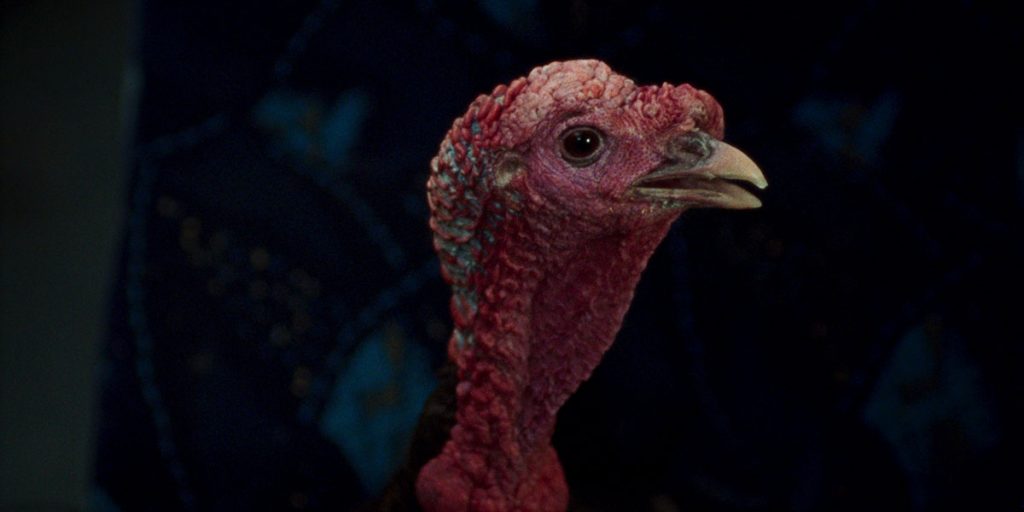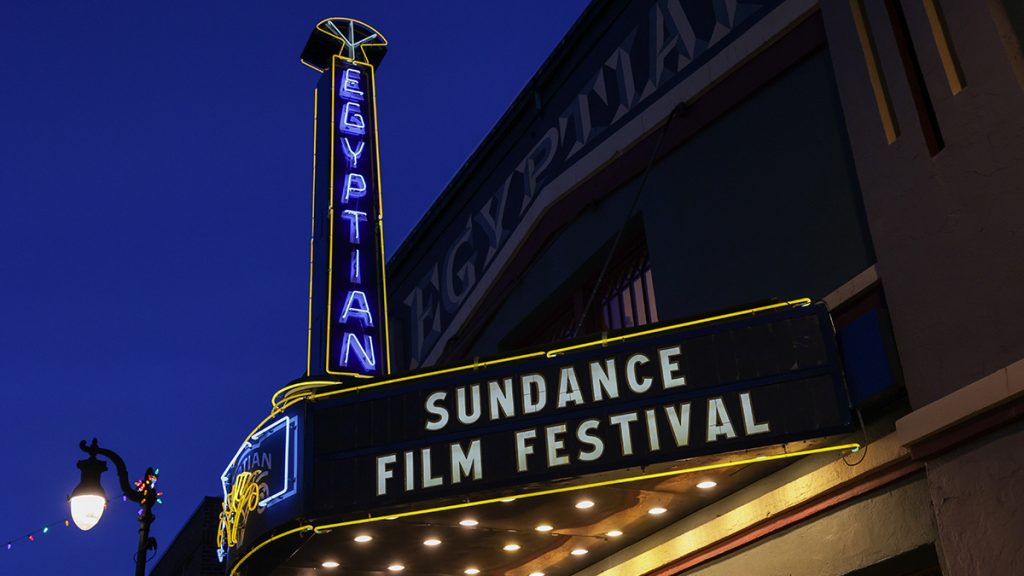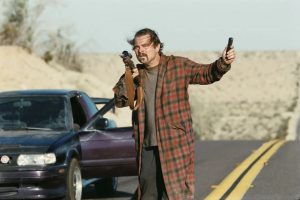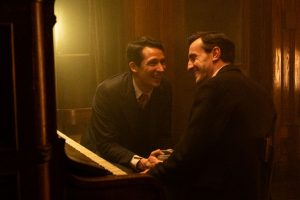Reviews include One Battle After Another, Eleanor the Great, and Peak Everything.
TFCA Friday: Week of Feb. 7
February 7, 2025

Welcome to the TFCA weekly, a round-up of reviews and coverage by members of the Toronto Film Critics Association.
In Release this Week
Atomic Reaction (dir. Michèle Hozer)
“Atomic Reaction makes good use of archival footage and interviews with a variety of scientists, authors, witnesses and experts, including Brian Bromley, great-grandson of Gilbert LaBine, and photographer Robert Del Tredici, founder of the Atomic Photographer’s Guild,” writes Liz Braun at Original Cin. “Certain interviews and first-person accounts allow the documentary to present a monumental story on a human scale, keeping Atomic Reaction emotionally as well as intellectually engaging. The film is an educational, albeit disturbing, watch, but knowledge is power. One hopes.”
Becoming Led Zepplin (dir. Bernard MacMahon)
“As the band’s first officially sanctioned feature documentary, a certain decorum holds sway; there are no stories about groupie-shagging, occult-exploring or hotel-room-trashing that often dominate other Zeppelin sagas,” writes Peter Howell at the Toronto Star. “Not much footage exists of early Led Zeppelin shows, and what there is often resembles Impressionist paintings when blown up to IMAX heights from its likely 16-mm film sources. Yet the sound is consistently fantastic and the energy is electric.”
Bogota: City of the Lost (dir. Kim Seong-je)
“Told and narrated by the 22-year-old Guk-hee, the film has a personal touch that allows the audience to identify with the protagonist and his family,” says Gilbert Seah at Afro Toronto. “The film stays away from the easy wrought of being an action film but instead focuses on a story that deals with the resilience of the human spirit – in this case the survival of a man and his family in a strong and foreign new world – the world of Bogota, Colombia.”
Bring Them Down (dir. Christopher Andrews)
“As a parable about the challenges of economic change and wounded male pride, this cursed family drama offers some psychological motivations but mostly it feels calculated as a calling-card film, designed to show what the director might do with a Hollywood budget,” writes Liam Lacey at Original Cin. “On its own modest terms, this blood-soaked drama feels extreme and more than a little absurd.”
“Shot in rural Ireland, this intense and depressing film displays the hardships of sheep farming with the added stress of feuding neighbours,” adds Gilbert Seah at Afro Toronto. “The film repeats a few scenes resulting in a disordered chronological order, but the narrative is still easy to follow. A solid climax brings the riveting film to an unexpected end.”
“Bring Them Down is just bleak for the sake of being bleak, and while one couldn’t accuse Andrews of not achieving his goals, the result is something that’s more dull than unsettling,” says Andrew Parker at The Gate. “It’s potent, but empty misery.”
Dark Match (dir. Lowell Dean)
“Although Dark Match is undoubtedly an homage to grindhouse films and the horror styles of the ‘80s, it also transcends the veneer of its setting. It’s easy to find a connection between costumed identity and authentic self, or to consider how landscape and situation can expand the diversity of character possibilities,” writes Thom Ernst at Original Cin. “However, the great thing about Dark Match is that you don’t need to ponder such things. You can simply enjoy it as a dramatic, violent, and wholly satisfying thriller. I did.”
Heart Eyes (dir. Josh Ruben)
“Certainly, the film has its flaws. The final confrontation scene goes on for too long, and there are plot holes that, before being adequately addressed, impede the film’s flow as one attempts to piece together the inconsistencies. However, Heart Eyes is overall a winner, a crowd-pleaser, and likely to secure its place among seasonal classics,” says Thom Ernst at Original Cin. “Ruben, who also directed the lesser-known yet equally hilarious Werewolves Within (2021), might be carving out his own niche in the comedy-horror market. If this is the case, Heart Eyes is already solidifying his status as one of the best in the field.”
“I guess Heart Eyes is fine if you don’t think about it at all while it’s unfolding,” admits Andrew Parker at The Gate. “If you can get past the stop-start nature of the narrative that sometimes leaves a lot of space between the great bits, you’ll be able to forgive a lot. I didn’t love this, but you could convince me to watch another one of these. It’s one of those things where I think they could get it right the next time out, like this is a test run for something that can be improved upon.”
Look at Me (dir. Taylor Olson)
“Olson has chosen to shoot the film mostly in black-and-white and in a variety of aspect ratios to mirror his character’s claustrophobic journey. They’re good choices — you don’t have to be intimately connected to the protagonist’s struggles to feel what he’s going though, and to root for him, sometimes despite himself,” says Chris Knight at Original Cin. “Look at Me is a thought-provoking film that might want to end with a more-information website or helpline, but there’s no need to open on such a note. Disturbing? Sure. But also vital, lively, and extremely watchable.”
Love Hurts (dir. Jonathan Eusebio)
“Universal gives Ke Huy Qian, the recent Academy Award Winner from Everything Everywhere, All at Once a leading role in his first movie,” writes Gilbert Seah at Afro Toronto. Unfortunately, Love Hurts ends up a terrible movie, a pauper’s version of Kingsman or even John Wick films. Ke looks like a poor man’s Jackie Chan either way his comedic Martial-Arts fights are not funny nor exciting. The interjection of the Valentine’s Day romance is silly and a cheap rip-off of the holiday celebrations. The film is also unnecessarily violent. The story is infantile, the performances infantile and the chemistry between Ke and DeBose non-existent. The sure worst film of 2025 so far. This film HURTS!”
“Aside from the actors — Quan is joined by his Goonies costar Sean Astin in one scene, which is kinda sweet — there isn’t much depth of experience among the crew. The three writers have done the odd bit of TV and podcast writing, but not much film work. And director Jonathan Eusebio is a stunt performer and stunt coordinator making his first foray into directing, unless you count his second-unit work on a handful of films,” notes Chris Knight at Original Cin. “What emerges is a messy tale that throws together some barely there Russian gangsters, bookkeeping fraud (Rhys Darby pops up as a shady accountant) and a rival realtor who happens to have a black belt in karate. There’s also an office Valentine’s Day party, which in this age sounds like a harassment suit waiting to happen.”
No Other Land
(dir. Basel Adra, Yuval Abraham, Rachel Szor, Hamdan Ballal)
***TFCA Awards Winner: Special Citation***
“No Other Land is a very personal and moving film that effectively gets its message across,” says Gilbert Seah at Afro Toronto. “Though there is still no peace or resolve in the century-old conflict, the doc allows the audience to appreciate the meaningless human suffering that has resulted.”
“Over the past five years, Yuval and Basel have become friends,” notes Marc Glassman at Classical FM. “Through select footage, we see how their lives have evolved, even amid the hatred and despair; the two have grown to respect and genuinely enjoy each other. If there is hope in this difficult film, it’s in the friendship between the two. When a Palestinian and an Israeli can be friends, and this film shows that it’s possible, then someday peace and human rights may return to the land.”
“Beyond the systemic effort to erase families and communities, the film offers crucial evidence of dehumanizing practices and violence by the Israeli forces and civilian settlers incited to act violently,” says Pat Mullen at POV Magazine. “However, the film’s very existence is a significant plea for peace that acknowledges shared security through mutual freedom.” Mullen also speaks with directors Basel Adra and Yuval Abraham about their urgent story. “We made this movie to tell the people the truth. What’s happening to us is not just because of the Israelis, because Israel’s getting support from western governments like the U.S., Canada, and other governments,” said Adra. “People need to see what their money is serving and need to act because they have responsibility, not just from solidarity perspective, but their governments who supporting it. This needs to stop and people need to act about it, talk about it, vote for the right people.” And for Abraham, “the film is not only a work of art or historical document: It’s a tool for change.”
Trinity (dir. Martina Car and Anthony Audi; Feb. 18)
“[T]aps into generations of residents and their stories of suffering, the horror of the blast that was far brighter than the brightest sun, the earthquake that followed, the rocks and debris thrown twenty miles up into the atmosphere, and lasting trauma – all without explanation,” notes Anne Brodie at What She Said. “The US government and military then rained down the same devastation on Hiroshima and two days later Nagasaki, as part of Cold War strategies to protect the US from Russian nuclear attack.”
Universal Language (dir. Matthew Rankin)
***Nominee: Rogers Best Canadian Film***
“If you are thinking of buying Canadian this week, I suggest getting a ticket to Matthew Rankin’s Universal Language. Upon revisiting the film after seeing it last November, it struck me as more Canadian than I had first thought, a film about hybrid identities, an inhospitable climate, the poetry of the banal, and also wonderfully silly,” advises Liam Lacey at Original Cin. “Universal Language is something of bag of mixed nuts, a Frankenfilm, a cinematic turducken, with comic non-sequiturs and sight gags linked by three narrative strands. One strand is a pseudo-autobiographical story with the director, Matthew Rankin, playing a character called Matthew Rankin who ditches his civil service job in Quebec to return to Winnipeg to see his ailing mother.”
“As the credits roll and the last strains of “These Eyes” enliven a parade of strutting turkeys, one can’t help but feel a peculiar sense of displacement, as if we’ve just stumbled out of a fever dream induced by a potent combination of maple syrup and saffron,” says Peter Howell at the Toronto Star. “Universal Language leaves us in a state of delightful bewilderment, much like finding oneself suddenly transported to a Tim Hortons where the Timbits come with a steaming mug of existential crisis.”
“Identity and family—two tropes in Iranian cinema—resurface in Universal Language, as does a powerful emotion: sorrow. Matthew Rankin hasn’t just evoked Iranian cinema as a game. He sees the people in Winnipeg, the backdrop of his drama, as being lonely, polite but lost souls, finding it hard to connect to anyone or anything,” writes Marc Glassman at Classical FM. “Universal Language is a brilliant film—not just a theoretical construct—because he depicts the emotional similarity between the citizens of Tehran and Winnipeg. They’ll never connect—more’s the pity.”
File Under Miscellaneous
At What She Said, Anne Brodie reports the big news that 2019 Oscar winner (and TFCA Award winner) Parasite is back on the big screen in IMAX: “Thrilled to report that the impossible brilliance of Bong Joon-Ho’s Parasite is back on the big(gest) screen,” writes Brodie. “Six years after sweeping the Oscars and the globe, it returns as an IMAX exclusive today. Bong Joon-Ho’s nearly perfect, nerve-rattling comedy thriller Parasite is a shock to the system, outrageous, comic, deadly serious and genre-bending, precise, poetic and mathematical, symmetrical in its construction, and deeply satisfying. Ki-taek Kim, his wife, son and daughter are poor, with cell phones but no Wi-fi ekeing out a living folding pizza boxes. But they’re cunning, and set in motion an undetectable scam on the wealthy Park family in order to assume their lives.”
At CBC, Eli Glasner delivers this week’s Emilia Pérez controversy.
At The Gate, Andrew Parker looks at the short films screening as part of Canada’s Top Ten: “Each of this year’s selected shorts offer something special and unique to viewers. Shorts have the ability to turn audiences on to big ideas in small packages. None of these ten films spell everything out for the viewer, offering a lot to interpretation and careful parsing of the characters, themes, settings, and images. They don’t take up much of a viewer’s time in the moment, but they will linger in the memory long after they’ve ended. It’s a lot to take in, but in a good way.”

A Festival of Festival Coverage: The Best of Sundance
At the Toronto Star, Peter Howell picks the ten best films of the Sundance Film Festival, including Sorry, Baby: “In one of the most exciting Sundance debuts I can recall, Eva Victor writes, directs and acts in a time-shifting story that balances deadpan humour with acute pain. ‘Something pretty bad happened to me,’ says her protagonist, Agnes,” writes Howell. “She’s a traumatized grad student and new prof on a journey of healing with no signposts or calendar. The story is expansive; its humanist lens, however, is tightly focused on Agnes and those close to her. Co-stars Naomi Ackie, Lucas Hedges and Kelly McCormack also excel, but this is Victor’s glorious moment.” Other standouts include 2000 Meters to Adriivka, Train Dreams, Folk Tales, and Didn’t Die.
At POV Magazine, Pat Mullen reports on the documentaries at the Sundance Film Festival. He agrees that the audience made the right choice in honouring Ryan White’s Come See Me in the Good Light as the top film of the festival: “Arguably Ryan White’s best film yet as a director, Come See Me in the Good Light marks the Sundance standout for its unwavering ability to immerse audiences in emotion. This documentary offers a truly poetic and refreshingly intimate consideration of life in the face of death. It’s a five-alarm ugly cry of a movie as White observe the poets as they navigate the procedures that prolong [Andrea] Gibson’s life and ease (somewhat) their pain,” writes Mullen. “This film isn’t afraid to make people feel because, ultimately, emotions are reminders that we’re alive. It’s an accessible portrait of life and death, a profound consideration of love told with a poet’s touch. There’s wonderful catharsis as Gibson’s strength and awesome poetry wrap the film with a warm hug.” Other favourites include Endless Cookie, The Perfect Neighbor, Speak, and André Is an Idiot. And Twinless a clear favourite on the dramatic side!
TV Talk/Series Stuff
At What She Said, Anne Brodie checks out the true crime tale of Apple Cider Vinegar: “Blake paid the ultimate cost in her refusal to act medically on her diagnosis. And the story ain’t over yet; its hard to feel sympathy or empathy for these women unless their mental health was in question. But what a bold faced lie it all was – and what a story.” She also takes a trip to Saint-Pierre: “Such savagery in Saint–Pierre. Fun, easy on the eyes, and packed with offbeat island characters.” And Norman Lear’s still delivering with series like Clean Slate: “It’s cute, easy going and a departure from standard sitcoms,” says Brodie. Meanwhile, the four-parter The Love Club Moms continues the “franchise focussing on four close friends who stick together through romantic and domestic thick and thins.” And a strange Toronto tale gets the documentary treatment in the two-parter 50,000 First Dates: “A mystery and a debilitating future, it seems.”
At The Gate, Andrew Parker also takes a shot of Apple Cider Vinegar: “This is a story about bad actors, grifters, and misguided true believers doing terrible things all so they can be seen as experts on healing, and it’s bound to garner strong reactions from viewers. But love it or loathe it – and I happen to love it – Apple Cider Vinegar will leave everyone in its wake with purposefully mixed emotions and plenty to think about.”



